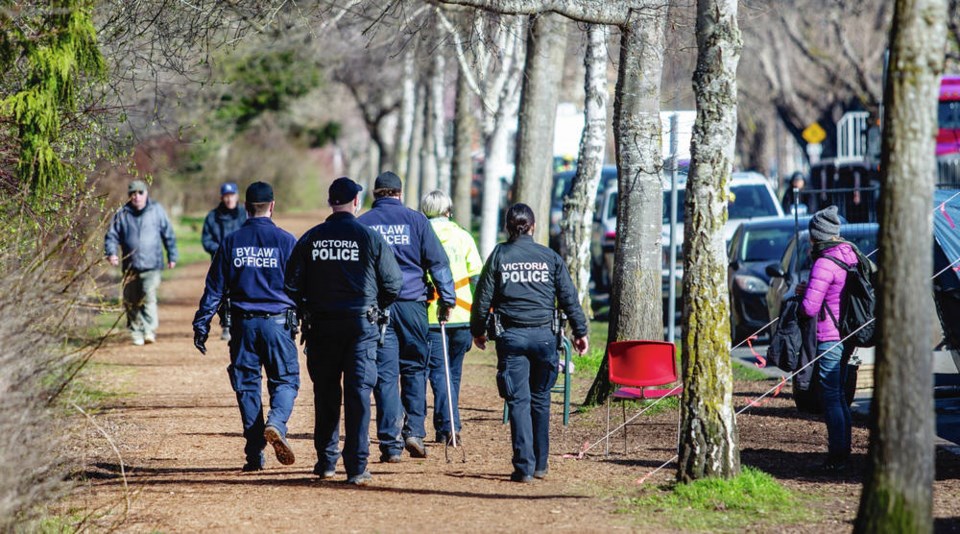A commentary by the mayors of Kelowna and Victoria, who are co-chairs of the B.C. Urban Mayors’ Caucus.
Last fall, the B.C. Urban Mayors’ Caucus released its Blueprint for British Columbia’s Urban Future. The document contains four key issues that the caucus is working together with the provincial government and the Union of B.C. Municipalities to address.
Top of the list, and affecting all of our communities, is the challenges stemming from the mental-health and substance-use crises.
This fall, the province will be in the final stages of its Police Act review. We hope that this review will bring about much-needed modernization of law enforcement. We also hope it will meaningfully address the role that police have come to play as a de facto part of the health-care system.
Many of our residents across urban British Columbia are suffering from mental-health and substance-use issues and, increasingly, brain injury.
Added to this is a toxic drug supply, growing homelessness, and increasing stigma and anger. This crisis is putting enormous strain on our police departments and RCMP detachments, and it’s stretching municipal budgets already affected by COVID-19.
The current police-respond-first approach to mental-health and substance-use calls doesn’t adequately address the reality of the complex needs in our communities for people who continue to fall through the cracks.
Because there aren’t enough resources available to address mental health, addictions, homelessness and vulnerable residents requiring complex care, police are frequently called upon to attend to residents struggling with mental-health and substance-use issues. This leads to an expensive download of health-related costs to police, and therefore to local governments.
In 2021, Kelowna Regional RCMP will respond to an estimated 4,900 mental-health-related calls, compared with 2,800 in 2016. Between mid-2017 and mid-2021, Victoria has seen an increase from 17.7 per cent to 25.4 per cent of incidents attended by police where the attending officers assessed deteriorated mental health as being a factor in the matter giving rise to police attendance.
The magnitude of these types of calls across all our communities strains the primary functions of police. Police are being used to fill the gaps where urgent social support and health care are required.
This takes them away from more appropriate front-line responsibilities, such as foot patrols and being out on the streets connecting with the community. It also leaves less time to fight serious crime through proactive, intelligence-led policing.
In addition, using front-line police services to address mental health and substance use can be stigmatizing and perpetuates the criminalization of vulnerable people, while, at the same time, forcing police to deal with calls which other services are better equipped to address.
The B.C. Urban Mayors’ Caucus proposes specialized health-care teams as a key solution that will allow our police to go back to policing and will provide vulnerable people with the care they need.
Access to mental-health and addiction services needs to be consistent throughout the province and resourced by specialized health care teams available 24 hours a day, seven days a week, in the same way our policing system operates.
Currently, if someone is having a mental-health episode in one of our downtown streets in the middle of the night, there are no emergency mental health services available, there is no one but police to call.
Current models such as Assertive Community Treatment Teams, Assertive Outreach Teams, and the Integrated Mobile Crisis Teams are making progress, but they need increased investment and capacity from the provincial government.
Local governments rely primarily on property taxes to fund all services; this is not sustainable, and this funding source cannot meet the existing and growing need. Local governments should not be responsible for health-care provision through policing. In addition, the province should seek ways to fund civilian-led health teams for when police are not required. These teams should be available 24/7.
Police can continue to play a role with these teams, but should be actively involved in an incident only at the request of the specialized health team or if there is a risk to public safety. And wellness checks should always be performed by health-care workers who have specialized knowledge and training.
In terms of dispatch, having the 911 fire-police-ambulance options as the only choices if someone is in urgent mental distress does not meet the needs of residents in mental-health distress as it most often results in armed police attending health-based situations, which can escalate tensions.
Other alternatives — including a fire-police-ambulance- mental health option or an expanded 811 call system — should be considered.
We are grateful the province is reviewing the Police Act. We hope our submission and those of our police leaders help to truly modernize the Act and put mental health and substance use where they belong — in the health-care system rather than the criminal-justice system.
- - -
Comment on this article by writing a letter to the editor: letters@timescolonist.com



